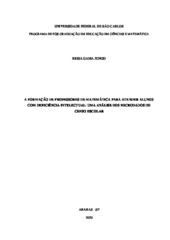| dc.contributor.author | Jungo, Brisa Gama | |
| dc.date.accessioned | 2022-07-05T15:02:31Z | eng |
| dc.date.available | 2022-07-05T15:02:31Z | eng |
| dc.date.issued | 2022-05-06 | eng |
| dc.identifier.citation | JUNGO, Brisa Gama. A formação de professores de matemática para atender alunos com deficiência intelectual: uma análise dos microdados do censo escolar. 2022. Dissertação (Mestrado em Educação em Ciências e Matemática) – Universidade Federal de São Carlos, Araras, 2022. Disponível em: https://repositorio.ufscar.br/handle/ufscar/16351. | * |
| dc.identifier.uri | https://repositorio.ufscar.br/handle/ufscar/16351 | por |
| dc.description.abstract | The training of teachers in the inclusive perspective still proves to be challenging as the classroom presents a rich diversity, awakening to teachers the need to improve their training, both initial and continuing. The specificities demand from the teacher the recognition, acceptance and respect for the difference present in the school context as well as adequate preparation, aligning theory and pedagogical practice, for the development of effective methods in serving students with special educational needs and/or some type of disability, thus promoting not only access to these students in regular education, but ensuring quality education for all. In this sense, this work established an analysis of the training of mathematics teachers about Special Education from the perspective of Inclusive Education and, on the other hand, on the effective enrollment of Special Education students, based on the collection of information in the microdata of the school census, in the state of São Paulo in the years 2010, 2015 and
2020. Our analyzes were based on the assumptions of the Historical Cultural Theory that allows us to understand human development, on the Historical-Critical Pedagogy that allows us to establish relationships with the training and performance of teachers and on Historical and Dialectical Materialism that brought support for the apprehension of quantitative data in its material and historical context. We conclude that training, especially the initial one, must bring inputs to make the teaching and learning process in mathematics possible in an inclusive perspective, aligning pedagogical practice with scientific knowledge and that continuing education, in turn, must complement the initial and not supply possible flaws of this process. Furthermore, although historical changes in legislation are evident, it is urgent to review policies for inclusive education and teacher training, as well as breaking stigmatized perceptions about the role of teachers and the special education public. | eng |
| dc.description.sponsorship | Não recebi financiamento | por |
| dc.language.iso | por | por |
| dc.publisher | Universidade Federal de São Carlos | por |
| dc.rights | Attribution-NonCommercial-NoDerivs 3.0 Brazil | * |
| dc.rights.uri | http://creativecommons.org/licenses/by-nc-nd/3.0/br/ | * |
| dc.subject | Formação de professores de matemática | por |
| dc.subject | Deficiência intelectual | por |
| dc.subject | Educação inclusiva | por |
| dc.subject | Censo educacional | por |
| dc.subject | Mathematics teacher training | eng |
| dc.subject | Intellectual disability | eng |
| dc.subject | Inclusive education | eng |
| dc.subject | Educational census | eng |
| dc.title | A formação de professores de matemática para atender alunos com deficiência intelectual: uma análise dos microdados do censo escolar | por |
| dc.title.alternative | The training of mathematics teachers to attend students with intellectual disability: an analysis of school census microdata | eng |
| dc.type | Dissertação | por |
| dc.contributor.advisor1 | Lozano, Daniele | |
| dc.contributor.advisor1Lattes | http://lattes.cnpq.br/6775248941851933 | por |
| dc.description.resumo | A formação de professores na perspectiva inclusiva ainda se mostra desafiadora à medida que a sala de aula apresenta uma rica diversidade, despertando aos docentes a necessidade de aprimoramento da sua formação, tanto inicial quanto continuada. As especificidades demandam do docente o reconhecimento, aceitação e respeito à diferença presente no contexto escolar bem como um preparo adequado, alinhando teoria e prática pedagógica, para o desenvolvimento de métodos eficazes no atendimento de alunos com necessidades educacionais especiais e/ou algum tipo de deficiência, promovendo assim não apenas o acesso a estes alunos no ensino regular, mas garantindo uma educação de qualidade a todos. Neste sentido, este trabalho estabeleceu análise da formação de professores de matemática acerca da Educação Especial na perspectiva da Educação Inclusiva e, em contrapartida, sobre as matrículas efetivas de alunos da EE, a partir da coleta de informações nos microdados do censo escolar, no estado de São Paulo dos anos 2010, 2015 e 2020. Nossas análises foram pautadas nos pressupostos da Teoria Histórico Cultural que nos permite compreender o desenvolvimento humano, na Pedagogia Histórico Crítica que nos possibilita estabelecer relações com a formação e atuação dos professores e no Materialismo Histórico e Dialético que trouxe o suporte para apreensão dos dados quantitativos em seu contexto material e histórico. Concluímos que a formação, sobretudo, a inicial, deve trazer insumos para que seja possível o processo de ensino e aprendizagem em matemática na perspectiva inclusiva, alinhando a prática pedagógica ao conhecimento científico e que a formação continuada, por sua vez, deve complementar a inicial e não suprir possíveis falhas deste processo. Ademais, embora sejam evidentes as movimentações históricas na legislação, é urgente a revisão de políticas de educação inclusiva e de formação docente, bem como o rompimento de percepções estigmatizadas acerca do papel dos docentes e do público da educação especial. | por |
| dc.publisher.initials | UFSCar | por |
| dc.publisher.program | Programa de Pós-Graduação em Educação em Ciências e Matemática - PPGEdCM-Ar | por |
| dc.subject.cnpq | CIENCIAS HUMANAS::EDUCACAO::ENSINO-APRENDIZAGEM | por |
| dc.publisher.address | Câmpus Araras | por |
| dc.contributor.authorlattes | http://lattes.cnpq.br/4067227463599442 | por |


